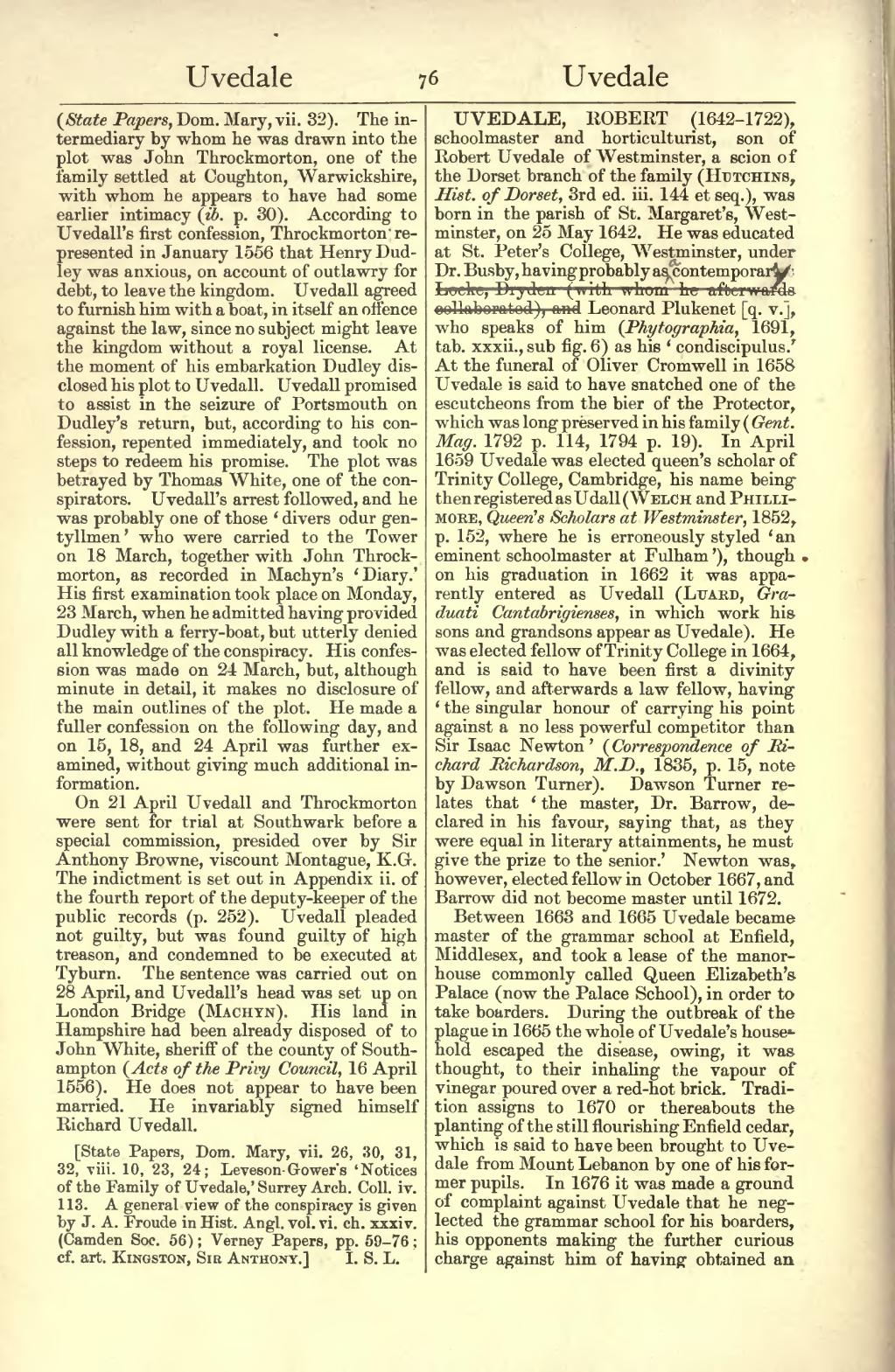(State Papers, Dom. Mary, vii. 32). The intermediary by whom he was drawn into the plot was John Throckmorton, one of the family settled at Coughton, Warwickshire, with whom he appears to have had some earlier intimacy (ib. p. 30). According to Uvedall's first confession, Throckmorton represented in January 1556 that Henry Dudley was anxious, on account of outlawry for debt, to leave the kingdom. Uvedall agreed to furnish him with a boat, in itself an offence against the law, since no subject might leave the kingdom without a royal license. At the moment of his embarkation Dudley disclosed his plot to Uvedall. Uvedall promised to assist in the seizure of Portsmouth on Dudley's return, but, according to his confession, repented immediately, and took no steps to redeem his promise. The plot was betrayed by Thomas White, one of the conspirators. Uvedall's arrest followed, and he was probably one of those ‘divers odur gentyllmen’ who were carried to the Tower on 18 March, together with John Throckmorton, as recorded in Machyn's ‘Diary.’ His first examination took place on Monday, 23 March, when he admitted having provided Dudley with a ferry-boat, but utterly denied all knowledge of the conspiracy. His confession was made on 24 March, but, although minute in detail, it makes no disclosure of the main outlines of the plot. He made a fuller confession on the following day, and on 15, 18, and 24 April was further examined, without giving much additional information.
On 21 April Uvedall and Throckmorton were sent for trial at Southwark before a special commission, presided over by Sir Anthony Browne, viscount Montague, K.G. The indictment is set out in Appendix ii. of the fourth report of the deputy-keeper of the public records (p. 252). Uvedall pleaded not guilty, but was found guilty of high treason, and condemned to be executed at Tyburn. The sentence was carried out on 28 April, and Uvedall's head was set up on London Bridge (Machyn). His land in Hampshire had been already disposed of to John White, sheriff of the county of Southampton (Acts of the Privy Council, 16 April 1556). He does not appear to have been married. He invariably signed himself Richard Uvedall.
[State Papers, Dom. Mary, vii. 26, 30, 31, 32, viii. 10, 23, 24; Leveson-Gower's ‘Notices of the Family of Uvedale,’ Surrey Arch. Coll. iv. 113. A general view of the conspiracy is given by J. A. Froude in Hist. Angl. vol. vi. ch. xxxiv. (Camden Soc. 56); Verney Papers, pp. 59–76; cf. art. Kingston, Sir Anthony.]
UVEDALE, ROBERT (1642–1722), schoolmaster and horticulturist, son of Robert Uvedale of Westminster, a scion of the Dorset branch of the family (Hutchins, Hist. of Dorset, 3rd ed. iii. 144 et seq.), was born in the parish of St. Margaret's, Westminster, on 25 May 1642. He was educated at St. Peter's College, Westminster, under Dr. Busby, having probably as contemporaries Locke, Dryden (with whom he afterwards collaborated), and Leonard Plukenet [q. v.], who speaks of him (Phytographia, 1691, tab. xxxii., sub fig. 6) as his ‘condiscipulus.’ At the funeral of Oliver Cromwell in 1658 Uvedale is said to have snatched one of the escutcheons from the bier of the Protector, which was long preserved in his family (Gent. Mag. 1792 p. 114, 1794 p. 19). In April 1659 Uvedale was elected queen's scholar of Trinity College, Cambridge, his name being then registered as Udall (Welch and Phillimore, Queen's Scholars at Westminster, 1852, p. 152, where he is erroneously styled ‘an eminent schoolmaster at Fulham’), though on his graduation in 1662 it was apparently entered as Uvedall (Luard, Graduati Cantabrigienses, in which work his sons and grandsons appear as Uvedale). He was elected fellow of Trinity College in 1664, and is said to have been first a divinity fellow, and afterwards a law fellow, having ‘the singular honour of carrying his point against a no less powerful competitor than Sir Isaac Newton’ (Correspondence of Richard Richardson, M.D., 1835, p. 15, note by Dawson Turner). Dawson Turner relates that ‘the master, Dr. Barrow, declared in his favour, saying that, as they were equal in literary attainments, he must give the prize to the senior.’ Newton was, however, elected fellow in October 1667, and Barrow did not become master until 1672.
Between 1663 and 1665 Uvedale became master of the grammar school at Enfield, Middlesex, and took a lease of the manor-house commonly called Queen Elizabeth's Palace (now the Palace School), in order to take boarders. During the outbreak of the plague in 1665 the whole of Uvedale's household escaped the disease, owing, it was thought, to their inhaling the vapour of vinegar poured over a red-hot brick. Tradition assigns to 1670 or thereabouts the planting of the still flourishing Enfield cedar, which is said to have been brought to Uvedale from Mount Lebanon by one of his former pupils. In 1676 it was made a ground of complaint against Uvedale that he neglected the grammar school for his boarders, his opponents making the further curious charge against him of having obtained an
